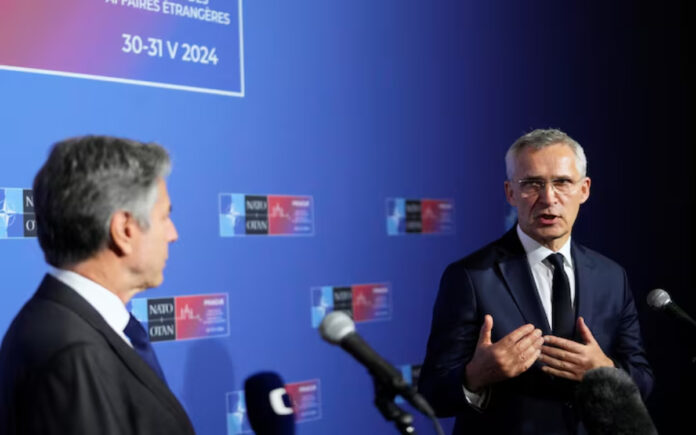Prague: NATO chief Jens Stoltenberg rebuffed Russian President Vladimir Putin’s recent warnings regarding the potential escalation resulting from Kyiv’s utilization of Western weaponry for strikes inside Russian territory.
Addressing reporters on the sidelines of a NATO foreign ministers’ gathering in Prague, Stoltenberg brushed aside Putin’s remarks, emphasizing that such warnings were not novel to the alliance. “This is nothing new. It has been the case for a long time that every time NATO allies are providing support to Ukraine, President Putin is trying to threaten us to not do that,” Stoltenberg stated.
He underlined Russia’s role in escalating tensions by invading another country, countering Putin’s assertions. The discourse arose after several NATO members lifted restrictions on the use of weaponry provided to Ukraine.
Also Read | Medvedev’s Warning to NATO: Ramifications of Strikes Extend Beyond Ukraine
In a significant policy shift, U.S. President Joe Biden authorized Kyiv’s limited use of U.S.-supplied arms within Russian borders, particularly in areas adjacent to the Kharkiv region. Biden’s decision, disclosed by officials speaking anonymously, applies to targets near the border where Moscow’s offensive since May 10 has advanced.
Stoltenberg supported Ukraine’s right to target legitimate military objectives inside Russia, citing the geographical proximity of the frontline to the border. He argued that it was unreasonable to expect Kyiv not to retaliate given the circumstances, highlighting the importance of advanced weaponry for Ukraine’s defense.
Also Read | Famine Threat Looms Over Sudan as UN Raises Alarm on Dire Situation
Asserting NATO’s stance on supporting Ukraine’s right to self-defense without implicating alliance members in the conflict, Stoltenberg reiterated its consistency since February 2022 and maintained the principle.
In Berlin, a German government spokesperson affirmed Ukraine’s entitlement to employ weapons supplied by Berlin for self-defense against attacks originating from just inside Russia along the Kharkiv border region, in adherence to international law.



